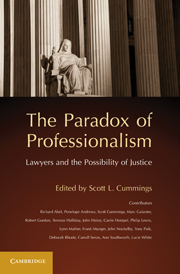Book contents
- Frontmatter
- Contents
- List of Tables and Figures
- Contributors
- Preface and Acknowledgments
- 1 Introduction
- PART I LAWYERS AND THE PUBLIC GOOD: THE FUNDAMENTAL DILEMMA
- 2 Are Lawyers Friends of Democracy?
- 3 “The Conscience of Society?”
- 4 More Lawyers than People
- 5 Faces of the Tort Pyramid
- PART II LAWYERS AND THEIR CLIENTS: DETERMINANTS OF ETHICAL PRACTICE
- PART III LAWYERS AND SOCIAL CHANGE: MOBILIZING LAW FOR JUSTICE
- 14 Epilogue
- Index
- References
2 - Are Lawyers Friends of Democracy?
Published online by Cambridge University Press: 05 June 2012
- Frontmatter
- Contents
- List of Tables and Figures
- Contributors
- Preface and Acknowledgments
- 1 Introduction
- PART I LAWYERS AND THE PUBLIC GOOD: THE FUNDAMENTAL DILEMMA
- 2 Are Lawyers Friends of Democracy?
- 3 “The Conscience of Society?”
- 4 More Lawyers than People
- 5 Faces of the Tort Pyramid
- PART II LAWYERS AND THEIR CLIENTS: DETERMINANTS OF ETHICAL PRACTICE
- PART III LAWYERS AND SOCIAL CHANGE: MOBILIZING LAW FOR JUSTICE
- 14 Epilogue
- Index
- References
Summary
INTRODUCTION
Anyone who watched the pictures of Pakistani lawyers, in their dark business suits and ties, out on the street in the thousands to protest General Pervez Musharraf's 2007 removal of the country's chief justice, knew he was seeing something way out of the ordinary. We do not usually associate lawyers with street protests, or with popular politics of any kind. Do we even associate them with democracy?
In answering this question, I define “democracy” very loosely, to include much more than government by leaders or legislators elected (directly or mediately) by popular votes – though of course these are classical preconditions for democratic government. Societies are more or less democratic to the extent they exhibit institutional arrangements that enable ordinary people to get access to decision-making power – political, economic, or social – in matters that affect their lives; that enable people to lobby or petition power holders and to influence public opinion through the media; to organize in associations so that power holders will have to take account of them and bargain with them; to have access to effective procedures and representation to challenge decisions adverse to their interests in administrative proceedings and courts and private governments; to have resort to regular channels to resist enforcement of unpalatable laws; and to express dissent without fear of retribution.
- Type
- Chapter
- Information
- The Paradox of ProfessionalismLawyers and the Possibility of Justice, pp. 31 - 49Publisher: Cambridge University PressPrint publication year: 2011

